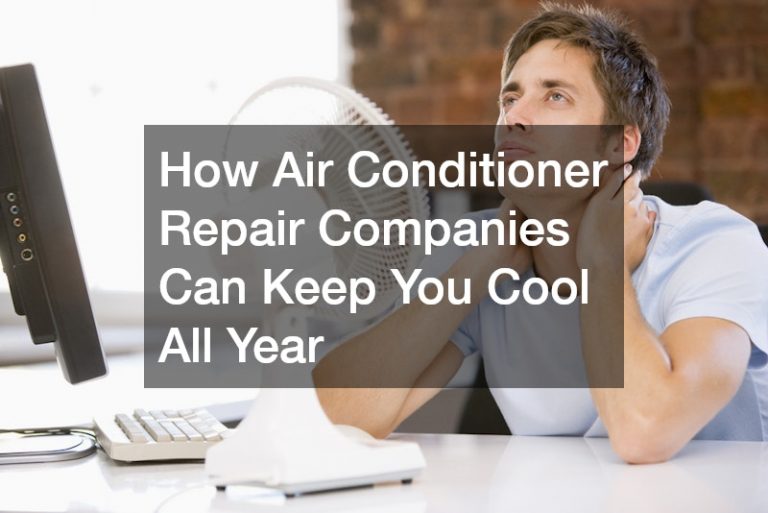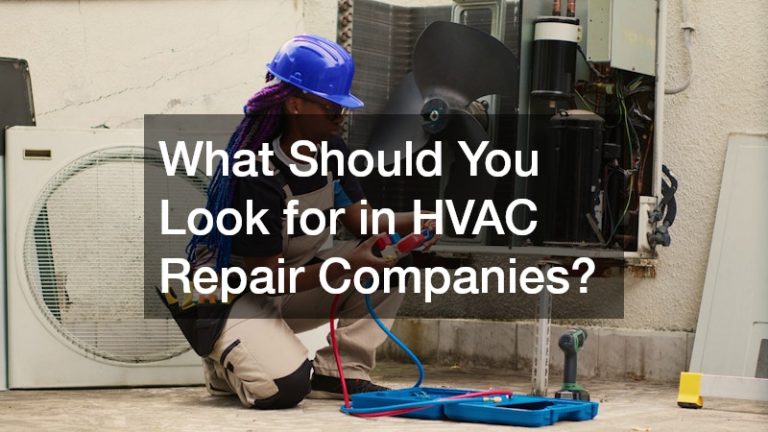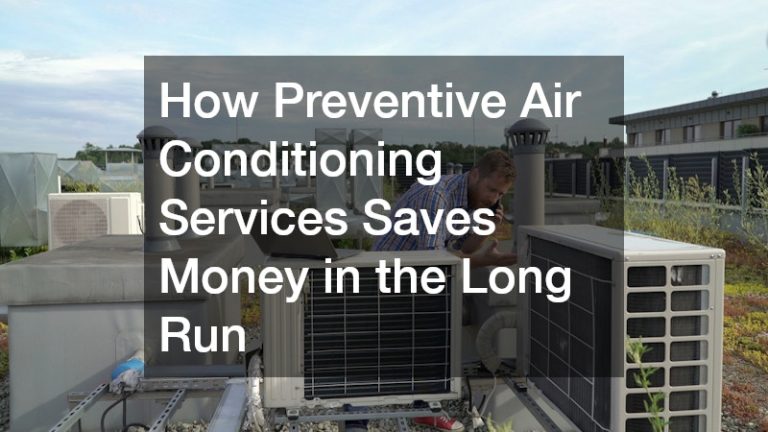HVAC systems are integral to maintaining comfortable indoor environments, ensuring air quality, and contributing to a building’s energy efficiency. These systems are not only pivotal for comfort but also have a significant environmental impact due to their energy consumption patterns. Improving HVAC efficiency can lead to considerable cost savings and reduced emissions, making it a critical objective for building managers and owners.
Migrating to more efficient HVAC systems helps combat the negative environmental effects of energy consumption. Consequently, optimizing these systems through regular maintenance, strategic upgrades, and systematic improvements contributes to sustainable building practices. The following sections explore some actionable insights on maximizing HVAC efficiency for enhanced building performance.
This comprehensive guide delves into various aspects of HVAC efficiency improvement, from regular service calls to upgrading components. By understanding and implementing these strategies, businesses and property owners can achieve more energy-efficient and environmentally responsible operations. Whether you’re managing a single-family home or a large commercial property, these principles are universally beneficial.
1. How Often Should You Schedule HVAC Service Calls?
Regular HVAC service calls are essential to keep your system in top operating condition. Generally, it is recommended to schedule such checks at least twice a year—preferably at the start of the heating and cooling seasons. Consistent service allows technicians to catch small issues before they become large problems, potentially saving on costly repairs.
Emergency services for mechanical contracting can address unforeseen breakdowns, but regular maintenance should minimize the need for such responses. Service calls should include checking for signs of wear, calibrating controls, and ensuring all components, such as VRF system installations, are functioning correctly. This vigilance ensures the HVAC system runs efficiently throughout its lifespan.
Moreover, reliable HVAC service calls can help prolong the life of the system by maintaining optimal performance and efficiency. Enlisting the help of local electricians during maintenance tasks can also be beneficial, as they may assist with electrical assessments and repairs as needed. These proactive measures are integral for maintaining system integrity and energy efficiency over time. This section highlights the importance of regular heating repair.
Building owners should also consider scheduling reminders or using smart maintenance tracking tools to ensure timely service. This consistency can drastically reduce system wear and help avoid surprise malfunctions.
2. What are the Key Benefits of Regular HVAC Service Calls?
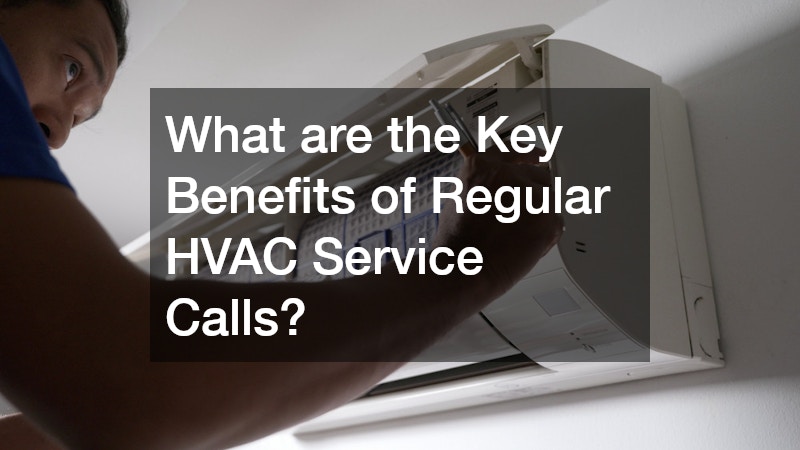
The primary benefit of regular ac repair service calls is the maintenance of high efficiency levels within the system. When performed consistently, these services ensure that each component is performing optimally, which can significantly reduce energy consumption. This not only cuts costs but also supports environmentally friendly practices by reducing energy waste.
A welcome benefit of routine maintenance is reduced likelihood of unexpected breakdowns, which can lead to costly repairs or replacements. Regular checks, especially on complex systems like VRF system installations, help prolong the equipment’s lifespan and maintain its efficiency. Regular servicing means resolving issues before they escalate, ensuring smooth and continuous operation.
Furthermore, these service calls enhance air quality by ensuring that systems are clean and filters are replaced on time. Keeping air ducts free from clogs and obstructions can prevent pollutants from circulating throughout the building. Ultimately, regular maintenance is an investment in the system’s long-term efficiency and reliability, providing peace of mind for building managers.
When documented properly, these service logs also become valuable records for warranty claims or real estate transactions. They demonstrate a proactive approach to maintenance and give potential buyers confidence in system health.
3. What are the Dangers of DIY Repairs?
Attempting HVAC repairs without professional guidance can result in personal injury, equipment damage, or system inefficiency. DIY approaches often lack the precision and expertise required for effective repair, leading to incomplete solutions or overlooked issues. Moreover, handling high-voltage systems or refrigerants without proper training poses serious risks.
In particular, attempting to repair or install complex systems like boilers without a certified boiler installer can lead to dangerous malfunctions or code violations. Improper installation of heating components can significantly reduce efficiency and increase the risk of system failure. Enlisting a licensed technician ensures repairs are done safely and in compliance with local standards.
DIY efforts may also void warranties, leaving property owners to shoulder the full cost of future repairs or replacements. The safest and most efficient approach is to hire professionals who are trained to diagnose and resolve HVAC issues correctly. This protects both the occupants and the long-term investment in the system.
Consider this common scenario: a property owner attempts to fix a heating unit on a cold winter day using a video tutorial. After a few hours, the system still isn’t functioning properly, and the damage is worse than before—costing more to fix than a routine service call would have. Such examples underscore the risks of going it alone without professional help.
Additionally, DIY repairs can result in energy inefficiencies that increase operating costs over time. A poorly calibrated thermostat or incorrectly sealed ductwork may lead to long-term waste that outweighs any short-term savings.
4. How Does Poor Air Duct Cleaning Affect Heating Performance?
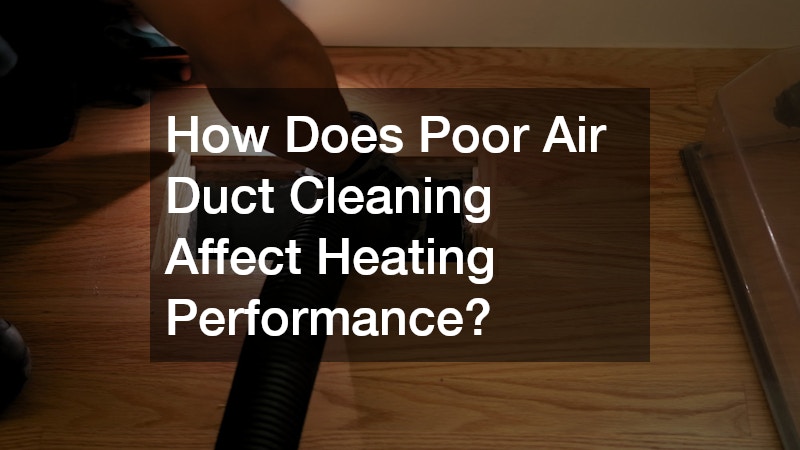
Air ducts are crucial for distributing heated or cooled air throughout a building, and their condition can hugely impact HVAC efficiency. Clean, sealed, and well-maintained ductwork ensures that energy is not lost and that air quality is high. Adequate wire seal techniques are necessary to eliminate leaks, minimizing energy wastage and maximizing system output.
A key factor in this process is the role of a conservation vent, which aids in balancing airflow and pressure within the duct system. Poorly maintained ducts or blocked vents can lead to inefficiencies and increased strain on HVAC systems. As a result, heating performance may decline, and energy consumption may rise.
Regular HVAC service calls should include assessments of the duct system. Professionals can identify and address any leaks or blockages that may be affecting performance. Proper duct maintenance enhances efficiency, as even minor leaks can lead to significant energy losses over time.
Moreover, duct cleaning contributes to the health of occupants by reducing the spread of allergens, dust, and pathogens. For buildings with sensitive populations, such as schools or healthcare facilities, this maintenance is even more critical.
5. What is the Lifespan of a Typical Heating System?
The lifespan of a heating system typically ranges between 15 to 20 years, depending on usage, maintenance, and quality of installation. Regular inspections and timely repairs are critical to prolonging this lifespan and ensuring optimal performance throughout the system’s operation.
Partnering with an experienced ac contractor helps ensure that system components are maintained or replaced as needed. They can also guide decisions regarding upgrades or retrofits to enhance performance. Proper maintenance and professional oversight extend equipment life and reduce long-term operating costs.
Monitoring system performance over time also allows building managers to identify when a unit is nearing the end of its operational life. This foresight enables timely replacements or upgrades that prevent costly emergencies and improve building efficiency overall.
To better understand system longevity, keep a maintenance log and track system alerts or performance dips. For instance, a sudden spike in heating bills could indicate your system is working harder than it should—often a sign that maintenance or replacement is due.
Also, newer models may offer advanced energy-saving features that are worth considering before your current system reaches the end of its lifecycle.
6. How Can I Reduce My Heating Bills?

Reducing heating bills often starts with enhancing HVAC system efficiency. Homeowners can achieve this by sealing leaks, improving insulation, and upgrading key system components. One often overlooked component is the toroidal inductor, which plays a critical role in regulating current and optimizing electrical efficiency.
Incorporating high-efficiency components such as modern thermostats and advanced duct sealing techniques can also yield substantial savings. These improvements reduce energy waste and maintain comfortable indoor temperatures more effectively.
Regular maintenance, including HVAC service calls, ensures these components function as intended, minimizing energy usage. Simple steps like replacing filters, cleaning ducts, and monitoring system performance can lead to meaningful reductions in heating costs over time.
Even minor behavioral changes—like lowering the thermostat by just a few degrees when you’re away—can result in noticeable savings over the course of a year.
Homeowners should also explore available rebates or incentives for installing energy-efficient systems. Local utility companies and government programs often offer support for upgrades that align with green energy goals.
7. How to Choose a Reliable Heating Repair Service?
Choosing a reliable heating repair service involves evaluating qualifications, reviews, and experience. Look for technicians who are licensed and certified to perform HVAC repairs. Trusted providers offer warranties on their work and maintain strong reputations for quality service.
An often overlooked factor is the presence of mold within HVAC systems, which can severely impact both efficiency and air quality. Experienced heating repair providers also offer mold remediation as part of their service package. This ensures systems not only function well but also promote a healthy indoor environment.
It is also important that your chosen technician has experience working with electrical components such as toroidal inductors, especially when diagnosing efficiency issues or planning system upgrades. These inductors play a key role in regulating electrical flow and ensuring the smooth operation of modern HVAC systems.
Asking for referrals and reading testimonials can help identify reputable contractors. Ensure the service provider conducts thorough inspections and explains issues and options clearly. This transparency fosters trust and ensures that you’re making informed decisions about your HVAC system.
You might also request a sample service report or ask for before-and-after efficiency metrics to better assess the provider’s impact.
Don’t hesitate to interview multiple contractors before deciding. A qualified technician should be able to explain their process clearly and offer a detailed quote.
8. What are the Most Common Heating System Problems?

Common heating system problems include thermostat malfunctions, clogged filters, pilot light issues, and blocked vents. These issues can arise due to poor maintenance or component wear, often leading to system inefficiencies or breakdowns.
Leak detection is especially critical in identifying hidden issues within HVAC systems. Undetected leaks can compromise system performance, increase energy consumption, and cause long-term damage. Advanced diagnostic tools allow technicians to locate and resolve these issues efficiently.
Timely repairs and regular maintenance help prevent minor problems from escalating into major failures. Educating property managers on warning signs and ensuring prompt response to performance issues can safeguard system longevity and performance.
Create a simple checklist for seasonal inspections—such as checking the thermostat, replacing filters, and inspecting visible ductwork—to catch issues early.
9. How Does Heating Repair Affect Home Value?
Investing in heating repair and HVAC upgrades can have a significant impact on home value. Prospective buyers prioritize homes with reliable and efficient systems, making regular maintenance a valuable asset during resale.
Services provided by crawlspace encapsulation companies also influence overall system efficiency and comfort. By insulating and sealing the crawlspace, these companies help stabilize indoor temperatures, reduce humidity, and prevent heat loss. This improves HVAC performance and enhances property value.
Furthermore, up-to-date systems reflect well on the property’s overall condition. Keeping records of service calls, repairs, and upgrades offers transparency to buyers and supports higher asking prices. Energy-efficient homes not only sell faster but often command a premium in competitive markets.
If you’re planning to sell in the next 1–3 years, consider a pre-listing HVAC tune-up to increase buyer confidence and enhance your property’s listing appeal.
10. Can Air Duct Cleaning Improve System Efficiency?
Yes, air duct cleaning can significantly enhance HVAC system efficiency by ensuring unobstructed airflow and reducing the strain on system components. Clean ducts also contribute to improved indoor air quality by eliminating dust, allergens, and other contaminants.
Duct cleaning often involves inspecting materials such as aluminum pipe, which is frequently used in ductwork due to its durability and heat resistance. Ensuring these materials are free of corrosion or blockages enhances airflow and system performance.
Incorporating regular duct cleaning into HVAC maintenance plans helps prevent buildup that can impede system function. By maintaining clean ducts and inspecting all components, property owners can achieve consistent performance and long-term efficiency.
Homeowners who suffer from allergies or respiratory issues may especially benefit from more frequent duct inspections and filter replacements.
To achieve optimal building performance, consistent attention to HVAC efficiency is imperative. Whether through regular HVAC service calls or strategic system enhancements, maintaining high operational standards is crucial. The insights offered in this guide help building managers to optimize their systems while embracing sustainability principles.
Honing in on detail-oriented maintenance and operational strategies, such as VRF system installations and air filter management, significantly impacts both energy consumption and system longevity. The commitment to environment-conscious practice not only supports a healthier planet but also yields significant cost savings over time.
Incorporating advancements in technology, including smart thermostats and renewable energy sources, complements traditional efficiency techniques. This comprehensive approach ensures that HVAC systems perform seamlessly, maintaining high efficiency levels and sustainability, hallmarks of modern building management.


